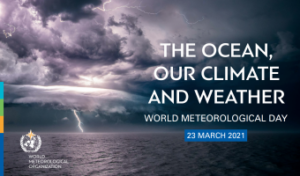The ocean, our climate and weather
 Toronto, March 23: Today, with World Meteorological Day looming, the World Meteorological Organization (WMO) has raised the issue of the ocean crisis. Climate change is having an adverse effect on the oceans, that’s for sure. The climate of the ocean is changing rapidly. The warmth of the sea is increasing with the height of the sea level. The wind on the surface of the ocean is becoming terrible. As a result, natural disasters like Tornadoes, cyclones and hurricanes are increasing, those causes loss of life and property.
Toronto, March 23: Today, with World Meteorological Day looming, the World Meteorological Organization (WMO) has raised the issue of the ocean crisis. Climate change is having an adverse effect on the oceans, that’s for sure. The climate of the ocean is changing rapidly. The warmth of the sea is increasing with the height of the sea level. The wind on the surface of the ocean is becoming terrible. As a result, natural disasters like Tornadoes, cyclones and hurricanes are increasing, those causes loss of life and property.
The Covid-19 pandemic has exacerbated this danger. That’s why research on ocean climate change has stalled. As a result, the source of information has shrunk. Predicting in advance is also becoming more complicated. In this situation, UN experts say, the ocean has never before faced such a threat. According to the agency, the ocean will fall into a deep crisis if we will not act in time. That will hamper trade and mankind will fall into crisis.
The World Meteorological Organization (WMO) has raised the issue of the crisis ahead of World Meteorological Day on today. This time the theme of the day is ‘Ocean, our climate and weather’.
According to UN News, a record number of hurricanes were seen in the Atlantic Ocean last year. There have been more cyclones in the southern Pacific Ocean and in the Indian Ocean. The main reason for this is the rising temperature of the ocean. Even though there is talk of rising sea levels due to climate change and the risk of flooding of coastal areas, the threat of global warming remains largely ignored.
“Forty percent of the world’s population lives within 100 kilometres of the coast,” said Ambassador Petteri Taalas, the WMO’s secretary general. So it is important to protect these people and their settlements from rising sea levels, terrible hurricanes or cyclones.
Petteri Taalas also warns that the effects of global warming on ocean ecosystems will be exorbitant. According to him, the earth will be dragged for hundreds of years.
The ocean economy is directly or indirectly involved in the livelihoods of more than 6 billion people worldwide. Blue Economy provides approximately $31.7 billion every year in world trade. Therefore, the WMO has warned that the change in the behaviour of the oceans will affect the livelihood of a large number of populations.
Millions of dollars worth of goods and lives are lost every year. The WMO has blamed strong winds, high winds, fog, thunderstorms and extreme weather conditions for this. The oceans absorb more than 90 percent of the atmosphere’s heat. This causes the temperature of the ocean to rise rapidly. The warm ocean currents can damage the livelihoods of people thousands of kilometres away.
The WMO has issued a warning about the future. The agency says that if greenhouse gas emissions are reduced and global warming is kept below 2 degrees Celsius, sea levels could rise by 30-60 centimetres by 2100. And if it is not possible to control the emission of greenhouse gases, then the amount can be 80-110 centimetres.


